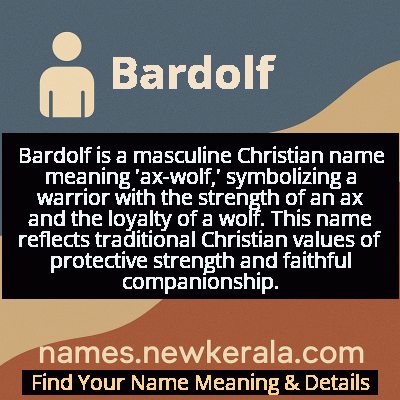Bardolf Name Meaning & Details
Origin, Popularity, Numerology Analysis & Name Meaning of Bardolf
Discover the origin, meaning, and cultural significance of the name BARDOLF. Delve into its historical roots and explore the lasting impact it has had on communities and traditions.
Name
Bardolf
Gender
Male
Origin
Christian
Lucky Number
4
Meaning of the Name - Bardolf
Bardolf is a masculine Christian name meaning 'ax-wolf,' symbolizing a warrior with the strength of an ax and the loyalty of a wolf. This name reflects traditional Christian values of protective strength and faithful companionship.
Bardolf - Complete Numerology Analysis
Your Numerology Number
Based on Pythagorean Numerology System
Ruling Planet
Uranus (Rahu)
Positive Nature
Strong sense of order, loyal, practical, and disciplined.
Negative Traits
Stubborn, overly serious, rigid, and prone to feeling restricted.
Lucky Colours
Blue, gray.
Lucky Days
Saturday.
Lucky Stones
Blue sapphire.
Harmony Numbers
1, 7, 8.
Best Suited Professions
Managers, engineers, accountants, organizers.
What People Like About You
Dependability, discipline, practicality.
Famous People Named Bardolf
Bardolf of Ravensworth
Norman nobleman
Early Norman lord in England who established the Ravensworth barony
Bardolf de Drayton
Knight and landowner
Prominent English knight who fought in the Crusades and established significant landholdings
Bardolf FitzOsbern
Military commander
Noted military leader during the Anarchy period known for strategic prowess
Name Variations & International Equivalents
Click on blue names to explore their detailed meanings. Gray names with will be available soon.
Cultural & Historical Significance
Throughout the Middle Ages, bearers of the name were typically minor nobility, knights, and landholders who played important roles in local governance and military service, embodying the Christian virtues of strength tempered by loyalty and duty. The name's persistence through centuries reflects its resonance with core medieval values of martial prowess combined with feudal loyalty, making it a significant artifact of naming practices that blended pre-Christian Germanic traditions with evolving Christian cultural norms in medieval Europe.
Extended Personality Analysis
Individuals named Bardolf are typically perceived as possessing a unique blend of strength and loyalty, reflecting the name's warrior-wolf etymology. They often demonstrate natural leadership qualities, combining strategic thinking with protective instincts toward those in their care. The 'ax' component suggests practical problem-solving abilities and decisive action, while the 'wolf' element indicates strong family bonds, pack mentality, and intuitive understanding of social dynamics. Bardolfs are often seen as reliable and steadfast, with a quiet intensity that commands respect without seeking attention.
They tend to be traditional in their values yet adaptable when circumstances require, showing the wolf's cunning alongside the warrior's honor. In relationships, they are deeply loyal and protective, often taking on guardian roles naturally and demonstrating unwavering commitment to their principles and loved ones. This combination of traits makes them particularly effective in positions requiring both strength and diplomacy, as they can assert authority when necessary while maintaining the loyalty and trust of their community. The name suggests someone who balances raw power with social intelligence, creating a personality that is both formidable and dependable.
Modern Usage & Popularity
In contemporary times, Bardolf remains an exceptionally rare given name, primarily used by families with strong historical connections or those seeking distinctive medieval names. Its usage peaked in the late 19th century during the Gothic Revival period but has since become quite uncommon. Today, it occasionally appears in historical reenactment communities, among genealogy enthusiasts rediscovering family names, or as a bold choice by parents drawn to unique Anglo-Saxon and Norman names. The name maintains a niche appeal for those appreciating its rich historical resonance and strong, masculine qualities, though it has never achieved mainstream popularity in modern naming trends and is considered a distinctive, almost archaic choice that stands out for its historical depth and unique character.
Symbolic & Spiritual Meanings
Symbolically, Bardolf represents the harmonious union of human weaponry and animal instinct - the ax symbolizing human craftsmanship, civilization, and deliberate action, while the wolf embodies wild nature, intuition, and pack loyalty. This combination creates a powerful metaphor for the balanced individual who can navigate both civilized society and primal challenges. The ax suggests the ability to cut through obstacles and shape one's destiny, while the wolf represents social intelligence, family protection, and survival wisdom. In Christian symbolism, the name can be interpreted as representing the Christian warrior who wields spiritual weapons against darkness while maintaining the loyalty and protective nature of the faithful servant, creating a rich tapestry of meanings that span practical strength, social bonds, and spiritual warfare.

